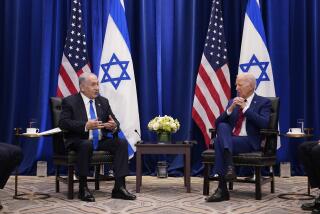Clinton Calls for Political Reconciliation in Somalia : Africa: He meets Italian premier and plans joint appeal for renewed U.N. initiative to re-create a functioning government.
- Share via
WASHINGTON — President Clinton, increasingly frustrated by the inability of U.N. forces to capture fugitive Somali warlord Mohammed Farah Aidid, said Friday that the world community must seek a political reconciliation that would restore order in the shattered African nation.
Clinton and visiting Italian Prime Minister Carlo Azeglio Ciampi said they had agreed to make a joint appeal to the United Nations to begin diplomatic and political efforts to re-create a functioning government in Somalia. But they freely confessed that they could offer no specific proposal for accomplishing that objective.
“Both of us believe that some renewed political initiative in Somalia is important, because in the end there has to be a political settlement that leaves the Somalis in control of their own destiny,” Clinton said during a press conference with Ciampi.
“The experience over these past months leads us to recommend a concrete program to be proposed jointly to the United Nations for the revival of a political initiative in Somalia,” Ciampi said. “This is the precondition for an effort to reconstruct the country, institutionally, economically.”
The United States and Italy, both of which have troops in the U.N. force in Somalia, have disagreed sharply over tactics in recent weeks, as what began as a humanitarian operation evolved into a military confrontation with Aidid and his supporters. Italy objected when U.N. special representative Jonathan Howe issued an arrest order for Aidid, and Ciampi’s government wants the United Nations to restrict the use of military force. The United States has supported Howe and has provided specially trained Army Rangers to lead the search for the warlord.
The Clinton-Ciampi call for a political settlement seems intended to paper over the dispute, but Clinton also made it clear that he is growing weary of the U.N. forces’ failure to deal effectively with Aidid.
“It is plain to me that it was never an option for us to continue to pursue a military solution or to be obsessed with Aidid or anybody else to the exclusion of trying to build a peaceful society,” Clinton said.
Meanwhile, a U.N. spokesman in Mogadishu confirmed Friday that the U.S. Army Rangers for the second time raided a building they thought was an Aidid stronghold only to find that it was not. This time the soldiers arrested supporters of Aidid’s archenemy, Ali Mahdi Mohamed, who backs U.N. efforts in Somalia. When they realized their mistake, they released the captives with apologies.
In his press conference, Clinton accused Aidid and his followers of provoking clashes with U.N. troops for the purpose of creating political dissension in the countries that have contributed soldiers.
“I’m disturbed not only that our troops under the U.N. banner have been increasingly embroiled in conflict which has led to the deaths of Somalis, but I’m also disturbed that this is plainly part of a strategy by supporters of Gen. Aidid to make the presence of the U.N. more unpopular . . . in all the member countries,” Clinton said.
The President said that Aidid cannot be included in any U.N.-mediated political initiative. But he said other warlords “have changed their behavior, have been cooperating with the United Nations” and, therefore, could join in restoring effective government.
Although Clinton has resisted calls for immediate withdrawal of American forces, he quickly rejected Howe’s request, unveiled Thursday at the United Nations, for 5,000 additional troops. The President said there is no need for additional forces.
Clinton also said at the press conference that he hopes China will not conduct a planned underground nuclear test. U.S. officials have been trying for the past several weeks to dissuade the Beijing government from carrying out the explosion.
“Let’s wait and see what they do. I’m still hopeful China will not do that,” he said, adding: “There is no reasonable threat to China.”
Last July, President Clinton announced that he would extend for at least 15 months the U.S. moratorium on underground nuclear testing. But he warned that if the moratorium were broken by another nation, he would direct the Energy Department to prepare to conduct additional tests.
“I would hope that the Chinese see their future in economic strength and step away from this,” Clinton said Friday.
Times staff writer John M. Broder contributed to this report.
More to Read
Sign up for Essential California
The most important California stories and recommendations in your inbox every morning.
You may occasionally receive promotional content from the Los Angeles Times.








